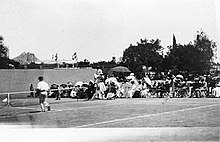Dionysios Kasdaglis
| Dionysios Kasdaglis medal table |
||
|---|---|---|
|
|
||
| Olympic Summer Games | ||
| silver | 1896 Athens | singles |
| silver | 1896 Athens | Double |
Dionysios Kasdaglis ( Greek Διονύσιος Κάσδαγλης also Demetrius Casdagli , born October 10, 1872 in Salford ; † July 6, 1931 ) was a Greek - Egyptian tennis player .
Life
Dionysios Kasdaglis is the brother of Xenophon Kasdaglis , who also won two medals in 1906 and was considered more talented than Dionysius. This was the only Egyptian participant in the Olympic Games in Athens in 1896 . He competed for Greece. He made it to the finals in both tennis competitions, singles and doubles . In the individual, his path led through J. Defert from France, Konstantinos Akratopoulos from Greece and Momcsilló Tapavicza from Hungary to the final, where he then played against John Pius Bolandfrom Great Britain and Ireland lost in straight sets. The medal was credited to Greece in the medal table. Kasdaglis teamed up with Dimitrios Petrokokkinos from Greece in doubles . The two defeated the Greek doubles Konstantinos Paspatis and Evangelos Rallis and later the British-Australian couple George Stuart Robertson and Edwin Flack in the semifinals. In the final Kasdaglis lost again to Boland, who formed a double together with the German Friedrich Adolf Traun . In 1906 in mixed doubles he also took part in the games, but lost in the first round.
In addition to his sporting work, Kasdaglis ran the Egyptian branch of his father's cotton industry from Manchester from 1895 until his death in 1931 . The separation from his wife Jeanne in 1917 set a precedent in British law on whether a Briton could live in Egypt after 1914.
Nationality controversy
The nationality of Kasdaglis is often controversial. The official report and the list of participants from 1896 and 1906 name Kasdaglis as Greek, as which he is also recognized by the IOC. Kasdaglis was originally of Russian origin and got its Greek name from his grandfather, who moved to Greece in the early 19th century. It was there that Dionysio's father, Emmanuel, was born, who started his cotton business in England. His children were born and raised in England. From 1914, Dionysius also tried to obtain an Egyptian citizenship. Most of the evidence suggests British citizenship at the time of the two competitions.
Web links
- Dionysios Kasdaglis in the Olympedia.org database (English)
Individual evidence
- ↑ Volker Kluge , The Olympic Games from 1896 to 1980. Names, numbers, facts, Sportverlag Berlin, (East) Berlin 1981, page 11.
| personal data | |
|---|---|
| SURNAME | Kasdaglis, Dionysios |
| ALTERNATIVE NAMES | Kasdaglis, Dimitrios E .; Casdagli, Demetrius |
| BRIEF DESCRIPTION | Greek-Egyptian tennis player |
| DATE OF BIRTH | October 10, 1872 |
| PLACE OF BIRTH | Salford |
| DATE OF DEATH | July 6, 1931 |
